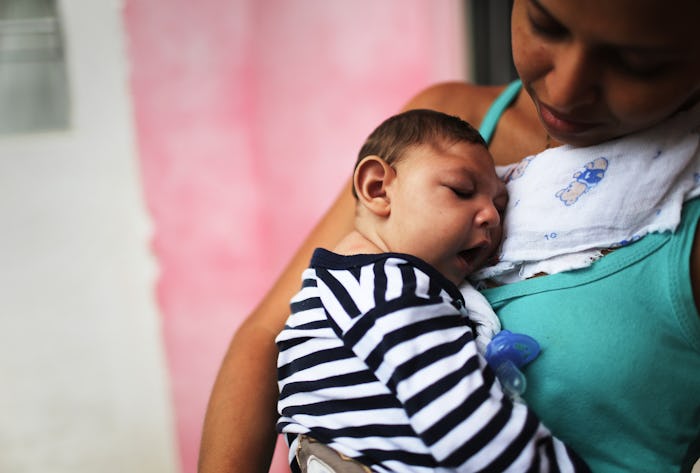Life

What Are The Signs Of Congenital Zika Syndrome? The Condition Has Parents Worried
Most of us have heard of the Zika virus by now, the virus carried by the Aedes aegypti mosquito that has been wreaking havoc (and creating panic) in 45 nations around the world. Pregnant women and their infants have been especially hard hit by the virus, and the news doesn't appear to be getting any better. A report released on Thursday by JAMA Pediatrics found that the congenital defects linked to Zika syndrome actually follow a pattern that researchers are now calling congenital Zika syndrome.
The Centers for Disease Control and Prevention researchers noted five specific types of birth defects that can specifically be linked to the congenital Zika syndrome in their report for JAMA Pediatrics. While a healthy adult could contract the virus and potentially only suffer flu-like symptoms (dry, red eyes, rash, fever, vomiting, headache, or muscle pain), the same does not hold true for infants. According to The Washington Post, tens of thousands of pregnant women have been infected with the Zika virus around the world. This infection can be passed through to their unborn children and cause a whole host of congenital birth defects that would very likely hinder the physical and emotional development of these children. To date, there is no vaccine against Zika and scientists have yet to find a cure.
According to Dr. Cynthia Moore of the CDC's Division of Congenital and Developmental Disorders:
[Zika virus (ZIKV)] infection in pregnancy appears to be the cause of a recognizable pattern of congenital anomalies that is consistent and unique. Although many of the components of this syndrome, such as cognitive, sensory, and motor disabilities, are shared by other congenital infections, 5 features differentiate CZS from other congenital infections.
These five symptoms are:
- Severe microcephaly (abnormally small head size) with partly collapsed skull
- Decreased brain tissue with a specific pattern of calcium deposits indicating brain damage
- Damage to the back of the eye with a specific pattern of scarring and increased pigment
- Joints with limited range of motion, such as clubfoot
- Too much muscle tone, restricting movement soon after birth
There are other issues that could present themselves in infants with congenital Zika syndrome include:
- loss of hearing
- fever or rash
- seizures
- irritability
- trouble swallowing
- problems with motor skills
The trouble is that some of these symptoms can also be indicative of other congenital infections, like congenital cytomegalovirus, rubella, varicella, and coxsackie B, which means that further diagnostic testing would need to be done in cases where congenital Zika syndrome is suspected.
It remains incredibly important for women who are pregnant or are planning on becoming pregnant to protect themselves from possible Zika infection, to avoid the above symptoms and a painful experience for their children.